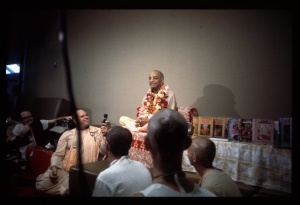SB 6.4.11: Difference between revisions
m (1 revision(s)) |
No edit summary |
||
| Line 1: | Line 1: | ||
{{info | {{info | ||
|speaker=King Soma, king of the trees | |speaker=King Soma, king of the trees | ||
|listener=Pracetās | |listener=Pracetās | ||
}} | }} | ||
[[Category:Srimad-Bhagavatam - Canto 06 Chapter 04]] | |||
[[Category:Bhagavatam Verses Spoken by Soma the King of the Trees - Vanisource|060411]] | |||
<div style="float:left">'''[[Srimad-Bhagavatam]] - [[SB 6|Sixth Canto]] - [[SB 6.4: The Hamsa-guhya Prayers|Chapter 4: The Haḿsa-guhya Prayers]]'''</div> | |||
<div style="float:right">[[File:Go-previous.png|link=SB 6.4.10]] '''[[SB 6.4.10]] - [[SB 6.4.12]]''' [[File:Go-next.png|link=SB 6.4.12]]</div> | |||
{{RandomImage}} | |||
==== TEXT 11 ==== | ==== TEXT 11 ==== | ||
<div | <div class="verse"> | ||
ātiṣṭhata satāṁ mārgaṁ | :ātiṣṭhata satāṁ mārgaṁ | ||
kopaṁ yacchata dīpitam | :kopaṁ yacchata dīpitam | ||
pitrā pitāmahenāpi | :pitrā pitāmahenāpi | ||
juṣṭaṁ vaḥ prapitāmahaiḥ | :juṣṭaṁ vaḥ prapitāmahaiḥ | ||
</div> | </div> | ||
| Line 16: | Line 22: | ||
==== SYNONYMS ==== | ==== SYNONYMS ==== | ||
<div | <div class="synonyms"> | ||
''ātiṣṭhata''—just follow; ''satām mārgam''—the path of the great saintly personalities; ''kopam''—the anger; ''yacchata''—subdue; ''dīpitam''—which is now awakened; ''pitrā''—by the father; ''pitāmahena api''—and by the grandfather; ''juṣṭam''—executed; ''vaḥ''—your; ''prapitāmahaiḥ''—by the great-grandfathers. | |||
</div> | </div> | ||
| Line 23: | Line 29: | ||
==== TRANSLATION ==== | ==== TRANSLATION ==== | ||
<div | <div class="translation"> | ||
The path of goodness traversed by your father, grandfather and great-grandfathers is that of maintaining the subjects [prajās], including the men, animals and trees. That is the path you should follow. Unnecessary anger is contrary to your duty. Therefore I request you to control your anger. | The path of goodness traversed by your father, grandfather and great-grandfathers is that of maintaining the subjects [prajās], including the men, animals and trees. That is the path you should follow. Unnecessary anger is contrary to your duty. Therefore I request you to control your anger. | ||
</div> | </div> | ||
| Line 30: | Line 36: | ||
==== PURPORT ==== | ==== PURPORT ==== | ||
<div | <div class="purport"> | ||
Here the words pitrā pitāmahenāpi juṣṭaṁ vaḥ prapitāmahaiḥ depict an honest royal family, consisting of the kings, their father, their grandfather and their great-grandfathers. Such a royal family has a prestigious position because it maintains the citizens, or prajās. The word prajā refers to one who has taken birth within the jurisdiction of the government. The exalted royal families were conscious that all living beings, whether human, animal or lower than animal, should be given protection. The modern democratic system cannot be exalted in this way because the leaders elected strive only for power and have no sense of responsibility. In a monarchy, a king with a prestigious position follows the great deeds of his forefathers. Thus Soma, the king of the moon, here reminds the Pracetās about the glories of their father, grandfather and great-grandfathers. | Here the words ''pitrā pitāmahenāpi juṣṭaṁ vaḥ prapitāmahaiḥ'' depict an honest royal family, consisting of the kings, their father, their grandfather and their great-grandfathers. Such a royal family has a prestigious position because it maintains the citizens, or ''prajās''. The word ''prajā'' refers to one who has taken birth within the jurisdiction of the government. The exalted royal families were conscious that all living beings, whether human, animal or lower than animal, should be given protection. The modern democratic system cannot be exalted in this way because the leaders elected strive only for power and have no sense of responsibility. In a monarchy, a king with a prestigious position follows the great deeds of his forefathers. Thus Soma, the king of the moon, here reminds the Pracetās about the glories of their father, grandfather and great-grandfathers. | ||
</div> | </div> | ||
__NOTOC__ | |||
<div style="float:right; clear:both;">[[File:Go-previous.png|link=SB 6.4.10]] '''[[SB 6.4.10]] - [[SB 6.4.12]]''' [[File:Go-next.png|link=SB 6.4.12]]</div> | |||
__NOTOC__ | |||
__NOEDITSECTION__ | |||
Revision as of 02:46, 12 May 2021

A.C. Bhaktivedanta Swami Prabhupada
TEXT 11
- ātiṣṭhata satāṁ mārgaṁ
- kopaṁ yacchata dīpitam
- pitrā pitāmahenāpi
- juṣṭaṁ vaḥ prapitāmahaiḥ
SYNONYMS
ātiṣṭhata—just follow; satām mārgam—the path of the great saintly personalities; kopam—the anger; yacchata—subdue; dīpitam—which is now awakened; pitrā—by the father; pitāmahena api—and by the grandfather; juṣṭam—executed; vaḥ—your; prapitāmahaiḥ—by the great-grandfathers.
TRANSLATION
The path of goodness traversed by your father, grandfather and great-grandfathers is that of maintaining the subjects [prajās], including the men, animals and trees. That is the path you should follow. Unnecessary anger is contrary to your duty. Therefore I request you to control your anger.
PURPORT
Here the words pitrā pitāmahenāpi juṣṭaṁ vaḥ prapitāmahaiḥ depict an honest royal family, consisting of the kings, their father, their grandfather and their great-grandfathers. Such a royal family has a prestigious position because it maintains the citizens, or prajās. The word prajā refers to one who has taken birth within the jurisdiction of the government. The exalted royal families were conscious that all living beings, whether human, animal or lower than animal, should be given protection. The modern democratic system cannot be exalted in this way because the leaders elected strive only for power and have no sense of responsibility. In a monarchy, a king with a prestigious position follows the great deeds of his forefathers. Thus Soma, the king of the moon, here reminds the Pracetās about the glories of their father, grandfather and great-grandfathers.